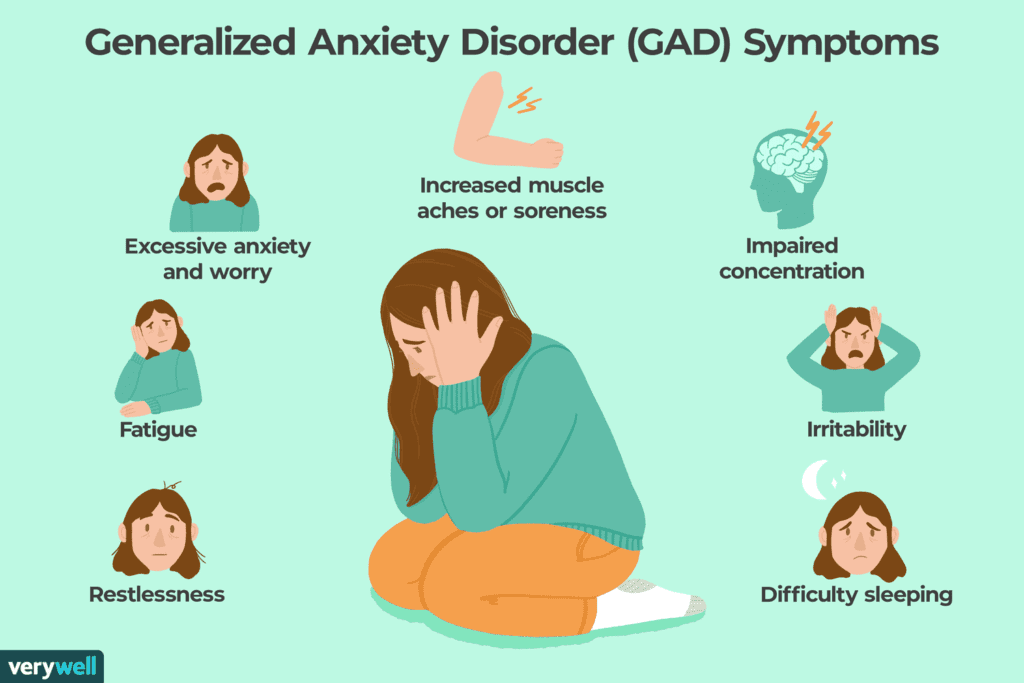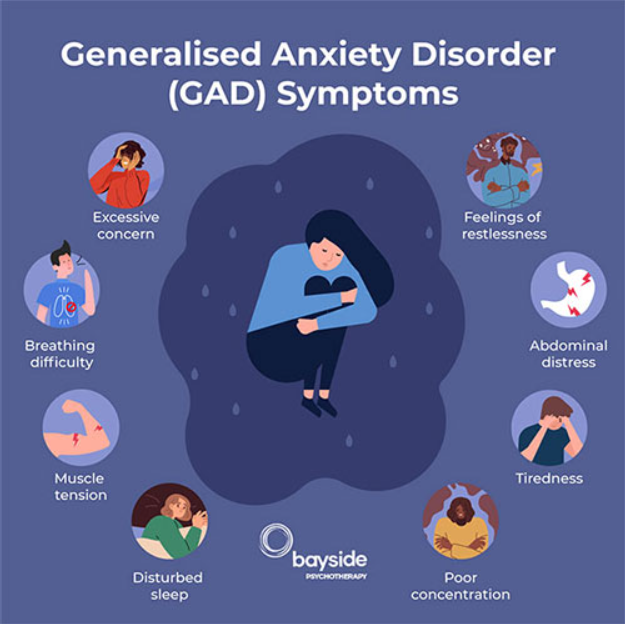
Generalized Anxiety disorder includes spectrum of diseases in which the most striking features are mental and physical symptoms of anxiety in the absence of any medical reason.
The disorders have common symptoms in their clinical picture and etiology, but there
are also differences:
● In generalized anxiety disorders, anxiety is always continuous, but it may fluctuate in its intensity.
● In phobic anxiety disorders, anxiety is always intermittent, related to specific environment .eg Anxiety symptoms in Dark room
● In panic disorder, anxiety is always intermittent but are not related to any specific situation.
Symptoms of generalized anxiety disorders are below
● Dry mouth
● Difficulty in swallowing
● Epigastric discomfort I.e; nausea
● loose motions
Palpitations
● Tightness/Discomfort in the chest
●increase heart rate, Awareness of missed beats
Genitourinary
● urgent need of micturition
● Failure of erection
● Menstrual cycle disturbance
Muscle tension
Tremor In Hands
Headache
Body aches
Hyperventilation
Feeling of Dizziness
Tingling in the extremities (arms and legs)
Feeling of breathlessness, choking
Sleep disturbance, intermittent awakening
Insomnia
Night terror , vivid dreams
The classification of anxiety disorders;
Anxiety disorders are divided into two named subgroups:
(a) anxiety disorder spectrum which
includes panic disorder and Generalized Anxiety Disorder
B) Phobic Disorders
1.specific phobia,
2.social phobia,
3.agoraphobia
Clinical picture
The symptoms of Generalized Anxiety Disorder (GAD) are mostly persistent .Most of the symptoms of anxiety can occur in GAD but with specific pattern which includes of following features:
● Marked Apprehension and widespread worries which are difficult to control.
● Marked Psychological arousal which may manifest in extreme irritability, poor concentration and extreme sensitivity to noise.
Autonomic overactivity is indicated by sweating,dry mouth
palpitations, dizziness and epigastric discomfort .
● Muscle tension, which may be manifested as restlessness, trembling, headache (usually bilateral and frontal or occipital) and Muscle tension of the shoulders and neck.
● Hyperventilation which may cause dizziness, tingling sensation in the extremities (arms and legs)
● Sleep disturbances ie; difficulty in falling asleep and persistent
Worrysome thoughts. Sleep is intermittent and followed by unpleasant vivid dreams. Eg; running in Fearful situations, seeing unpleasant creatures.
● Other symptoms which may include tiredness, obsessional
Symptoms and depersonalization.
FOR GAD diagnosis; symptoms must have been present for 6 months including atleast 5 to 6 above mentioned symptoms
Diseases which can result in similar symptoms of Anxiety
Schizophrenia
People suffering from schizophrenia mostly complains of anxiety before other symptoms are even recognized.It is usually linked to some delusional (false) belief.
Dementia
Anxiety can be the first abnormality in a person developing Dementia .it usually results from forgetting simple things.
Substance misuse
Many people take drugs /alcohol to relieve their anxiety.
The following conditions are especially
important:
● In thyrotoxicosis, the patient becomes irritable and restless with tremors and tachycardia.
Physical examination may reveal signs of
Thyrotoxicosis which are an enlarged thyroid, tachycardia , and
exophthalmos. In this case , thyroid function tests
Prevalence ;
GAD can happen In any age or gender but Rates in women are
about twice as high as in men.
some patients are genetically predisposed to have anxiety.
Genes expresses more Autonomic activity and environmental influences.
GAD occurs prevalent in people having anxious–avoidant
personality traits .These individuals are more prone to get GAD.
Self-help and psychoeducation
self-help for anxiety disorders has to be guided by psychologist or psychiatrist. (guided self-help). Making a diary for triggering effects
Relaxation training
This includes 1)Deep Breathing Exercise 2)Progressive muscle relaxation
3)Yoga
If patient practices it regularly, it significantly decreases less severe form of anxiety
Cognitive behaviour therapy
This treatment helps by combing relaxation with changing cognition (thought process)to overcome worrying thoughts .
Medication
Anxiolytic drugs (Benzodiazepines ) are given to reduces autonomic system stimulation by relaxing muscle tension and induction of interrupted sleep
Short-term treatment.longer-acting benzodiazepines, eg;
diazepam, is used for the short-term treatment of GAD—for
example, Anxiolytic drugs are used with caution as it can cause dependence on longer run.seldom given for period above 3 weeks.
Long-term treatment.
Selective serotonin reuptake inhibitors (SSRIs) are the first line of drug for treating GAD in long tterm.
Serotonin and noradrenaline reuptake inhibitors (SNRIs) like duloxetine
and venlafaxine can be given .
Anticonvulsant like pregabalin can also used for treating
GAD

1. Identification and assessment: educating regarding GAD and treatment
Options
2. Low intensity interventions: self-help and guided
self-help, problem solving and relaxation techniques .
3. High-intensity psychological intervention (cognitive
behaviour therapy or applied relaxation) or a drug treatment.
4. drug and psychological regimens):
crisis services or day hospitals
1.Anxiety is not real illness. In reality it’s a major illness involving not only your mind but also bodily disturbances.
2. Everyone gets worried, it’s normal.
It doesn’t just affects your personal life but also declines your occupation or job performance to a level where cannot cope with worrying thoughts .
3. Too much anxiety can give you a heart attack.
It can give you panic attack mimicking heart attack but it won’t kill you.
4.Best thing to avoid anxiety is to avoid triggering situation.
In reality avoidance will increase anxiety later on.
5. Drinking alcohol or smoking Marijuana would reduce anxiety .
Infact it will initially helps but later on make things worse as it causes addiction and dependence.
Best psychiatrist in Lahore,
387-E Khayaban-e-Firdousi, near Allahu chowk, Block E Phase 1 Johar Town, Lahore, Punjab 54782
Days and Timings:
Monday 03:00pm to 10:00pm
Wednesday 03:00pm to 10:00pm
Thursday 03:00pm to 10:00pm
Friday 03:00pm to 10:00pm
Sunday 03:00pm to 10:00pm
For appointment: 0321 1439754
CENTRAL HOSPITAL, GUJRANWALA
Days and Timings:
Saturday 02:00pm to 09:30pm
For appointment:
055-4277072
055-4277073
055-4277074
ONLINE VIDEO CONSULTATION
For appointment: +92 321 1439754